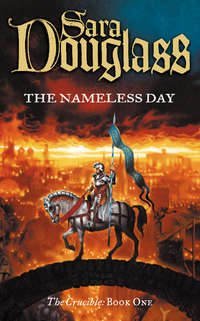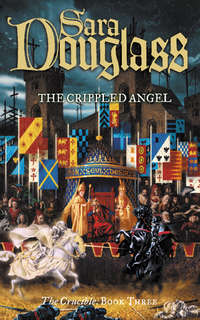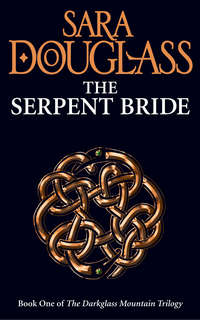
Полная версия
The Wounded Hawk
Neville looked back to his goblet again, then drank deeply from it. Why did he feel as though he were being played like a hooked fish?
“My lord,” said Jack Trueman, who had remained silent through this exchange, “may I voice a comment?” He carried on without waiting for an answer. “As many about this table have observed, the dissolution and immorality among the higher clerics must surely be addressed, and their ill-gotten wealth distributed among the needy. Jesus Himself teaches that it is better to distribute one’s wealth among the poor rather than to hoard it.”
There were nods about the table, even, most reluctantly, from Neville, who wondered where Trueman was heading. For a Lollard, he was being far too reasonable.
“But,” Trueman said, “perhaps there is more that we can do to alleviate the suffering of the poor, and of those who till the fields and harvest the grain.”
“I did not realise those who tilled the fields and harvested the grain were ‘suffering’,” Neville said.
“Yet you have never lived the life of our peasant brothers,” Trueman said gently. “You cannot know if they weep in pain in their beds at night.”
“Perhaps,” Wat Tyler said, also speaking for the first time, “Tom thinks they work so hard in the fields that they can do nothing at night but sleep the sleep of the righteous.”
“Our peasant brothers sleep,” Wycliffe put in before Neville could respond, “and they dream. And of what do they dream? Freedom!”
“Freedom?” Neville said. “Freedom from what? They have land, they have homes, they have their families. They lack for nothing—”
“But the right to choose their destiny,” Wycliffe said. “The dignity to determine their own paths in life. What can you know, Lord Neville, of the struggles and horrors that the bondsmen and women of this country endure?”
Neville went cold. He’d heard these words before from the mouth of the Parisian rebel, Etienne Marcel. And what had those words brought but suffering and death?
“Be careful, Master Wycliffe,” he said in a low voice, “for I will not have the words of chaos spoken in my household!”
Courtenay, very uncomfortable, looked about the table. “The structure of society is God-ordained, surely,” he said. “How can we wish it different? How could we better it?”
“There are murmurings,” Jack Trueman said, “that as do many within the Church enjoy their bloated wealth at the expense of the poor, so, too, do many secular lords enjoy wealth and comfort from the sufferings of their bondsmen.”
“Do you have men bonded to the soil and lordship of Halstow Hall, Lord Neville?” Wycliffe asked. “Have you never thought to set them free from the chains of their serfdom?”
“Enough!” Neville rose to his feet. “Wycliffe, I know you, and I know what you are. I offer you a bed for the night begrudgingly, and only because my Duke of Lancaster keeps you under his protection. But I would thank you to be gone at first light on the morrow.”
Wycliffe also rose. “The world is changing, Thomas,” he said. “Do not stand in its way.”
He turned to Margaret, and bowed very deeply. “Good lady,” he said, “I thank you for your hospitality. As your lord wishes, I and mine shall be gone by first light in the morning, and that will be too early for me to bid you farewell. So I must do it now.” He paused.
“Farewell, beloved lady. Walk with Christ.”
“And you,” Margaret said softly.
Wycliffe nodded, held Margaret’s eyes an instant longer, then swept away, his black robes fluttering behind him.
John Ball and Jack Trueman bowed to Margaret and Neville, then hurried after their master.
Furious that he could not speak his mind in front of Courtenay and Tusser, Neville turned on Tyler.
“And I suppose you walk with Wycliffe in this madness?”
Tyler held Neville’s eyes easily. “I work also for the betterment of our poor brothers, so,” he said, “yes, Tom, I walk with Wycliffe in this ‘madness’.”
“How dare you talk as if Wycliffe works the will of Jesus Christ!”
“Wycliffe devotes his life to freeing the poor and downtrodden from the enslavement of their social and clerical ‘betters’. Is that not what Jesus Christ gave his life for?”
“You will bring death and disaster to this realm, Wat,” Neville said in a quiet voice, “as Marcel did to Paris.”
Tyler’s face twisted, almost as if he wanted to say something but found the words too difficult.
Then, as had Wycliffe, he turned and bowed to Margaret, thanking her in a warm and elegant fashion, and bid her farewell. “Go with Christ, my lady.”
“And you, Wat.” Margaret turned her head slightly as soon as she had said the words, fearful that Thomas should see the gleam of tears within their depths.
Would this be the last time she ever saw Wat?
Wat Tyler stared at Margaret one more moment, then he, too, turned and left the hall.
II
The Tuesday before the Feast of SS Egidius and Priscus
In the first year of the reign of Richard II
(30th August 1379)
Mycliffe, Tyler and the other two priests were gone by the time Neville arose at dawn. Although Neville was grateful they had departed, he felt useless as well. He would, by far, have preferred to put Wycliffe under some form of detention before he caused any mischief … but to do so might well be to anger Lancaster, and that Neville did not want to do.
So he’d had to let the demon—as he had no doubt Wycliffe was—escape.
Neville set about his morning tasks, hoping they would consume his mind, but instead, his temper became shorter as the day wore on. He was useless stuck here in the wilds of Kent! When would Hal call him back to court?
The only thing that calmed his mood was when, in the early afternoon, he joined Margaret and Rosalind in their solar. Neville loved his daughter, and always made the time to spend an hour at least playing with her each day.
He strode into the room, greeting Margaret perfunctorily—not noticing her wince—and lifted Rosalind from her arms.
Neville grinned and ruffled the black, curly hair that Rosalind had inherited from him. She was strong now, and of good weight and size for her almost six months of age. She had recovered well from the trauma of her birth … perhaps it was her good Neville blood, Neville thought, for his entire family was of hearty stock and robust determination.
Margaret watched him with sadness. Her husband looked to Courtenay for friendship, and to his daughter for love, but to her … what? She took a deep breath, controlling her emotions, and then tilted her head as she heard a noise outside the door.
Neville glanced at her, irritated by the solemnity of her expression, then turned to the door as Courtenay strode through.
“My lord!” Courtenay said. “We have yet more company!”
He got no further, for a handsome man dressed in Hal Bolingbroke’s new livery as the Duke of Hereford pushed past Courtenay.
Neville’s eyes widened, for he recognised the man as Roger Salisbury, a young knight of noble family who had worked in Hal’s entourage for some time.
Roger Salisbury stopped several steps into the solar, and bowed.
“My Lord Neville,” he said, and was interrupted from further speech by Neville.
“Bolingbroke wants me,” he said.
“Aye, my lord. I bear greetings from my Lord of Hereford, and am to inform you of his wish that you return to his side in London within the week.”
Neville turned back to Margaret. “At last! I thought Bolingbroke had forgotten me!”
He stepped over to her and gently lowered Rosalind into her care. “I shall miss her,” he said, and did not notice the sudden humiliation in Margaret’s eyes.
Salisbury cleared his throat. “My Lord of Hereford also wishes that the Lady Margaret and your daughter ride with you.”
Neville’s eyes narrowed suspiciously. “Margaret is to ride with me?”
“Indeed, my lord,” Salisbury said. “Bolingbroke—” he lapsed into informality, for although Hal was now Duke of Hereford, he was familiarly known as Bolingbroke “—is to take the Lady Mary Bohun to wife within the month, and it is her wish that your lady wife serve at her side.”
Neville’s mouth twisted. “Mary Bohun does not know the Lady Margaret exists,” he said. “The wish is Bolingbroke’s alone.”
He paused, and in that pause allowed his suspicions their full malevolent flood. Why did Hal want Margaret within his household? Surely it would be better if she and Rosalind stayed within the safety of Halstow Hall? There was no need for Hal to want Margaret back, as well as him, unless … no, no. It could not be … And then there was Richard … in London, Margaret would be so close to Richard’s animal lusts … too close …
“Richard …” he said without meaning to put voice to his thoughts.
Salisbury looked at Neville. Bolingbroke had told him that Neville would fear for Margaret’s chastity around a king who had already made clear his desire for her.
“Bolingbroke,” Salisbury said carefully, “has stated that the Lady Margaret will enjoy the full protection of his household. She will come to no harm under my lord’s roof.”
Maybe not from Richard, Neville thought. But from Hal? Hal has made it plain enough to me that he wants Mary only for her lands. Does he now want the woman he does desire back under his roof?
“My lord husband,” Margaret said, rising. “You have told me previously that Lancaster thought I could do well to serve his wife, the Lady Katherine. But now that you have taken service with Bolingbroke, instead of his father, it is natural that I should serve Bolingbroke’s wife instead.”
Neville looked at her closely, but finally nodded his agreement to something he fully realised he had no choice in.
“Very well,” he said, silently vowing that he would ensure Margaret came to, nor caused, no harm.
III
The Feast of the Translation of SS Egidius and Priscus
In the first year of the reign of Richard II
(Thursday 1st September 1379)
Richard Thorseby, Prior General of the Dominican Order in England, sat at his desk in the dark heart of Blackfriars in London, slowly turning a letter over and over in his hand. His eyes were unfocussed, his sharp-angled face devoid of expression, and his equally sharp mind fixed on a memory of the previous Lent rather than on the contents of the letter …
The Dominican friary in the northern English city of Lincoln. The Lady Margaret Rivers, tearfully confessing that Brother Thomas Neville was the father of the bastard child in her belly. Neville himself, his behaviour, dress and conduct advertising to the world his blatant abuse of every one of his vows. And John of Gaunt, Duke of Lancaster, humiliating Thorseby and allowing Neville to escape Dominican discipline.
In the months since, Thorseby had never forgotten his affront, nor had he relaxed from his intention of bringing Neville to Dominican justice. Indeed, what had once been intention had now become obsession. Thorseby would move heaven and earth, if need be, to bring Neville to penitent knees.
Or worse.
But how to do so? Lancaster and his son, Bolingbroke, were powerful men, and Neville enjoyed their full support. If the arch-heretic, John Wycliffe, could escape the Church’s justice through Lancaster’s protection, then there was little Thorseby could do about the less-heretical problem of Thomas Neville. (Thorseby’s personal sense of insult would sway no one to attack the Lancastrian faction on his behalf.) For a time, Thorseby had thought he might be able to use the long-ago deaths of Neville’s paramour, Alice, and her three daughters, to his advantage. Surely Alice had well-connected family who would be pleased to see Neville brought to account for her death? Even her cuckolded husband could be useful.
But Alice’s family and husband proved disappointing. They were all dead: her parents, her sister, and even her husband, who had succumbed to a wasting fever while on a diplomatic mission to Venice four years previously. The family who were left—distant cousins—simply did not care overmuch … and certainly didn’t care enough to take on Lancaster and Bolingbroke.
“I will see you humbled yet, Neville,” Thorseby murmured, then blinked, and looked down at the letter in his hands.
It had arrived an hour ago, and was a summons to Rome where there was to be an Advent convocation of the Dominican Prior Generals. Normally, such a summons would irritate Thorseby; travel through Europe in November and December was never the most pleasant of pastimes, especially when the Advent and Christmas season was so busy here in England. But now such travel would give Thorseby the perfect opportunity to meet with those who had known Neville in the months when he had apparently decided to abandon completely his Dominican vows.
Somewhere in Europe lay the evidence that would enable Thorseby to extract Neville from Lancaster’s protection. Someone must have seen something that would damn Neville for all time; witnesses to a foul heresy, perhaps.
If there was one thing that Thorseby had learned from his Inquisitor brothers, it was that disobedience never goes totally unnoticed and unremarked upon.
Thorseby very carefully refolded the letter and put it to one side. He paused, briefly drummed his fingers on the desk, then leaned forward, picked up a pen, and began to compose the first of several letters he would send out later that evening.
Whatever he’d said to Neville, neither Wycliffe nor his companions had any intention of travelling to Canterbury in the near future. Tired and, on Wycliffe’s and Tyler’s parts, saddened by their inadequate farewells to a woman both loved in different ways, they’d moved directly from Halstow Hall south to the port city of Rochester.
There, as arranged, they met with several other men—two craftsmen and another Lollard priest—in a quiet room in an inn.
“Well?” Wycliffe said as he entered the room.
“Ready,” said one of the craftsmen. He indicated a stack of bundled papers. “Several hundred, as you requested.”
“Show me.”
The craftsman took a single large sheet of thick paper from the top of one of the piles and handed it to Wycliffe. Tyler, Ball and Trueman crowded about him, trying to read over his shoulder.
Wycliffe relaxed, then smiled at the three men he’d come to meet. “Very good. Wat?”
Wat was already shrugging off his distinctive livery, changing into the clothes one of the craftsmen handed him. Within minutes, he’d lost all appearance of a hardened sergeant-at-arms (save for his face) and looked more the prosperous farmer.
“You have mules for these men?” Wycliffe said.
“Yes,” the priest replied.
“Good.” Wycliffe turned to Tyler, Trueman and Ball. “My friends. You shall have the most troublesome of days ahead of you. Be careful.”
Then he smiled, the expression lightening his normally harsh face. “Remember, when Adam delved, and Eve span—”
“Then,” Wat finished for him, “there were no gentlemen!”
All the men broke into laughter, and, with that laughter were the seeds of revolution watered.
IV
The Feast of the Translation of St Cuthbert
In the first year of the reign of Richard II
(Monday 5th September 1379)
—i—
The Thames was quiet—most ships and boats had put into harbour so their crews could devoutly mark the feast day—and its grey-blue waters lapped gently at the side of the small sailing vessel as it passed Wolwych on the southern bank. One more turn in the river and the great, smoky skyline of London would rise above the cornfields and orchards spreading beyond the marshy banks.
Neville sat impatiently on a wooden bench in the stern of the vessel.
They had ridden from Halstow two days past and had taken ship in Gravesend at dawn today, leaving several men from Roger Salisbury’s escort with the horses to follow more slowly by road. The roads leading towards London from Kent and the other southern counties were crowded with merchant and grain traffic at this time of year, and the wheels and hooves of this traffic churned up the soft surface of the roads until they were nigh impassable in places. The Thames provided the faster and smoother course, and Salisbury had offered no objection when, the previous evening, Neville had suggested they complete their journey via the river; not only was it faster and more commodious, the river was safer and they could dock directly at the river gate of the Savoy rather than ride through the dust-choked London streets.
Margaret sat by Neville’s side, Rosalind asleep in her arms. She was content and fearful in equal amounts: content because the river wind was cool and soothing as it whispered across her face and through her hair; fearful because of the inevitable travails and treacheries ahead. She glanced at her husband. He was fidgeting with a length of rope, his body leaning forward slightly, his eyes fixed on the river ahead.
Margaret shuddered and looked to where Rosalind’s nurse slouched, dozing against a woolsack. Agnes Ballard was a homely woman in her late thirties who, three months previously, had in the same week lost her infant son to a fever and her husband to the savagery of a boar. Struggling to cope with her tragic loss, Agnes had been weepy-eyed with gratefulness when Margaret had suggested she wet-nurse Rosalind, replacing the nurse who had originally accompanied Margaret and Neville from London and who had wanted to return to her home. Agnes also acted as maid to Margaret herself, and Margaret enjoyed Agnes’ motherly attentions almost as much as she believed Rosalind did. Agnes was a simple woman (but not so simple that she did not harbour her own strange secrets), but she was honest and giving, and she allowed Neville’s occasional impatient or ill-meaning remarks to pass straight over her head.
Beyond Agnes, towards the prow of the vessel, sat Robert Courtenay with Roger Salisbury, who was laughing quietly with the remaining men of his escort and the three crew. They were rolling dice, and sharing a flask of wine between them.
Margaret shifted slightly, adjusting Rosalind’s sleeping weight in her arms, and hoped the flask contained only weak drink. Her mouth quirked a little as she imagined the stratagems of angels and demons alike drowning uselessly in the mud of the Thames if the drunken crew lost control of the sails and tipped everyone out.
Who would arrive to save us, she thought, as we flailed about? Would both the minions of heaven and hell shriek in a horrified chorus at the careless ruin of their conspiracies?
“At what do you smile?”
Margaret jerked out of her reverie and looked at her husband. “I was hoping Roger will not let the crew get too drunk, for it would be a disaster if the boat overturned.”
Her arms tightened slightly about Rosalind as she spoke, and Neville did not miss the movement.
He laid his hand on her arm. “There is no danger, Margaret. Nothing can—”
Margaret gave a low cry of terror, and gathered Rosalind so tightly against her breast that the baby awoke and cried out with protest.
Neville frowned, opening his mouth to speak, and then realised that Margaret was staring at something in the water on her side of the vessel.
He looked, and his breath caught so violently in his own chest that it felt as if his heart had stopped.
Beneath the rolling surface of the river spread a great golden glow.
Neville jerked his head around to look across the deck. The glow spread underneath the vessel to radiate an equal distance beyond on its other side.
“Tom!” Margaret said.
“Hush!” he said, and his hand gripped her arm tighter. “Hush!”
He looked towards Agnes, and to Courtenay Roger and their companions beyond her.
Agnes continued asleep, and the men were still engaged in their dicing as if nothing at all supernatural was gathering beneath the boards of the boat.
“Saint Michael!” Neville whispered, and Margaret whimpered and twisted about as if she wanted to jump overboard.
“Be still!” Neville said, moving his hand to her shoulder. Then he twisted a little himself so that he could stare directly into her terrified eyes.
“If you are as innocent as you have always claimed yourself to be,” he said, very slowly and carefully, “then why now do you fear?”
Sweet Jesu, why did he make it so easy to hate him? “I can have no innocence,” she hissed, a spark of anger stirring within her, “when you allow me none!”
As Margaret spoke the glow coalesced, first directly under the keel of the vessel, and then seething up through the timber to form a fiery column not two paces away. The column assumed the spectral shape of the archangel, and then his voice thundered around them.
You are corruption made flesh, Margaret. An abomination which should never have been allowed breath.
Agnes and the men continued their respective activities—only Margaret and Neville were blessed with the angelic presence.
Margaret’s lips curled at the archangel’s words. If the archangel had whispered sympathies to Margaret, he would have destroyed her, but his hatred only served to transform Margaret’s terror into fury.
Her face twisted in loathing. “If I am corruption made flesh,” she said, “then I am truly my father’s daughter!”
The archangel’s face took on a terrible aspect and his arms spread wide—impossibly wide, for it seemed to Margaret and Neville that they stretched from bank to bank. He hissed, and the sound was that of the wind of divine retribution.
Filth!
“I may be the daughter of filth,” Margaret said, her eyes locked onto the archangel’s face, “but I choose not to tread the path of filth!”
“Margaret!” Neville was unsure of the meaning of the exchange between St Michael and Margaret—did Saint Michael accuse Margaret of demonry, or merely of the charge of being the daughter of Eve, the burden that condemned all women?—but he was appalled at Margaret’s words and the anger she displayed towards the archangel.
“Divine saint,” Neville said, finally letting go of Margaret’s shoulder and sinking to his knees before the archangel. “Forgive her words, for—”
Do you not know what she is, Thomas?
Neville did not reply.
Do you not know? She is that which you seek to destroy, Thomas.
Still Neville did not reply, and he lowered his gaze to the planking before him.
What does she here at your side, Thomas? Why have you not killed her, as her issue?
Finally, Neville raised his eyes back to St Michael. “She is useful to me.”
Useful?
“She will draw out other corruption so that I may see it for what it truly is, and so that I might destroy it.”
Corruption is drawn to you anyway, Thomas. You know the foulness seeks to destroy you, before you destroy it.
“She is useful. She is a woman, after all.”
Then make sure you do use her, Thomas, but do not allow her to use you. Remember the price if you fail.
Neville gave a low, confident laugh—and, in that instant, Margaret truly did hate him. How could she ever have wanted him to love her?
“They think to trap all mankind into eternal damnation,” Neville said to the archangel, “by forcing me to hand her my soul on a platter, blessed saint. But there is no danger. I cannot possibly love her.”
She breathes, Thomas, therefore she is a danger.
“She is no danger,” Neville said, with such horrifying confidence that Margaret had to shut her eyes and force away her hatred of him. If she allowed herself to hate him, then the angels had won here and now … and was that why Michael had chosen to show himself before both her and Thomas? To force her into hatred of her husband?






